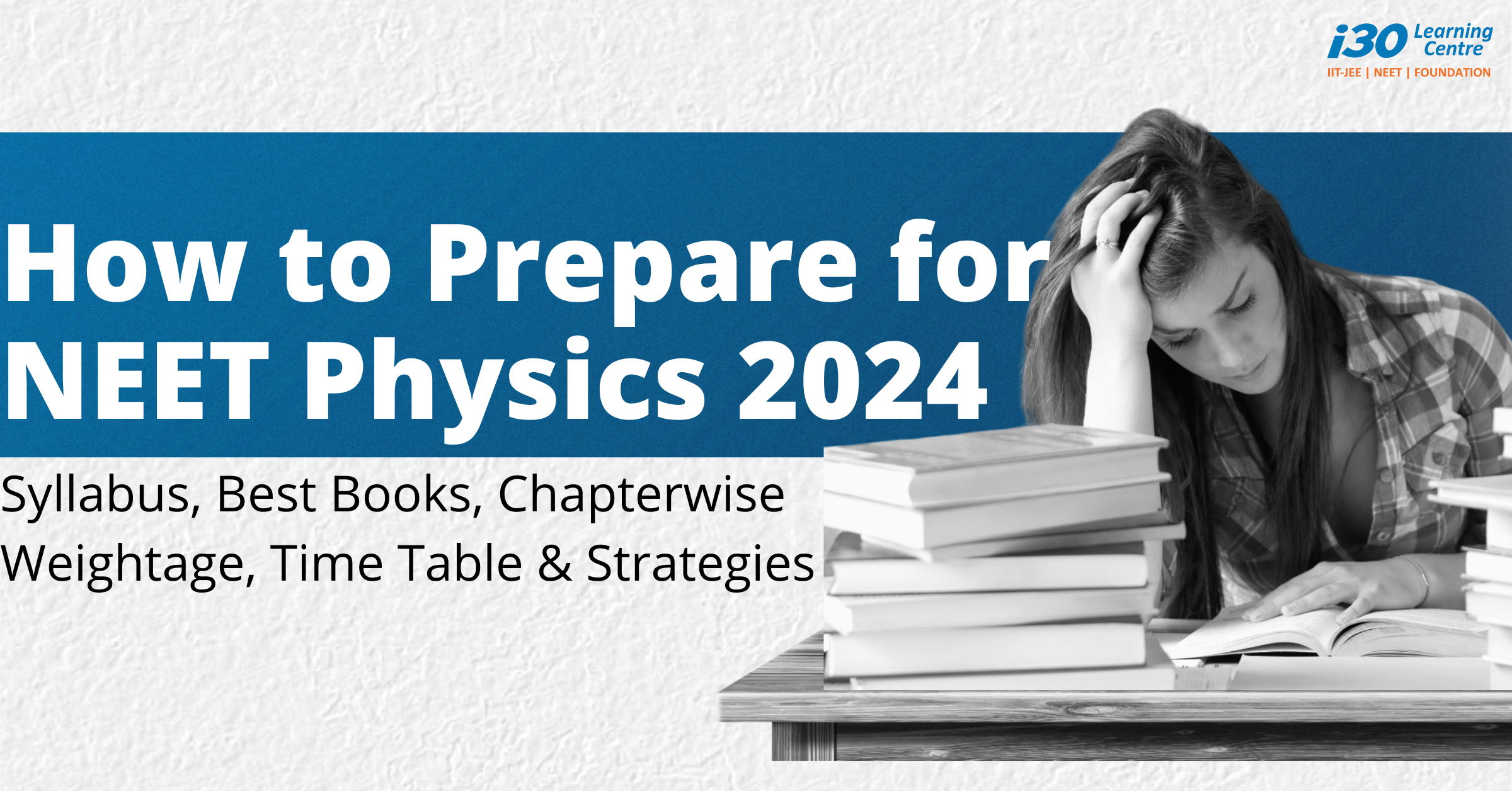NEET (National Eligibility cum Entrance Test) is an eminently competitive examination for medical aspirants in India. Physics, being one of the core subjects, plays a vital role in determining your overall score. To ace NEET Physics 2024, it is essential to have a solid preparation strategy that covers the syllabus comprehensively, utilizes the best books, understands chapter-wise weightage, creates a well-structured timetable, and employs effective strategies. In this article, we will guide you on how to prepare for NEET Physics 2024, providing insights into the syllabus, recommended books, chapter-wise weightage, timetable, and strategies.
NEET Physics aims to assess your understanding of various concepts, principles, and applications related to the subject. It is important to have a clear understanding of the syllabus and focus on mastering the fundamental principles rather than rote learning the entire textbook.
Best Books for NEET Physics 2024
Now that you know the syllabus, you must know the only essential books you’d need to refer to in order to achieve your dream NEET score, particularly NEET Physics, refer to the following books:
- “Concepts of Physics” by H.C. Verma
- “Fundamentals of Physics” by Halliday, Resnick, and Walker
- “Objective Physics for NEET” by D.C. Pandey
- “NEET Physics Guide” by Arihant Publications
- “Problems in General Physics” by I.E. Irodov
These books cover the NEET Physics syllabus comprehensively and provide ample practice questions for better understanding and preparation.
Chapterwise Weightage in NEET Physics
Understanding the chapter-wise weightage helps in prioritizing topics during preparation. Here is a general overview of chapter-wise weightage in NEET Physics:
- Mechanics (Kinematics, Laws of Motion, Work, Energy, and Power, etc.) – High weightage
- Electrodynamics (Electrostatics, Current Electricity, Magnetism, Electromagnetic Induction, etc.) – Moderate weightage
- Optics (Ray Optics, Wave Optics) – Moderate weightage
- Modern Physics (Dual Nature of Matter and Radiation, Atoms and Nuclei, Electronic Devices) –Moderate weightage
- Thermodynamics and Kinetic Theory – Low weightage
- Oscillations and Waves – Low weightage
While focusing on high-weightage chapters, it is important to have a basic understanding of all chapters.
Time Table for Execution:
Here is a well-structured timetable to help you organize your daily quota
Morning Session (2-3 hours)
- 6:00 AM – 6:30 AM: Rise and shine.
- 6:30 AM – 7:00 AM: Warm-up exercise or anything that you make yourself get off your bed.
- 7:00 AM – 8:00 AM: Breakfast and break.
Study Session 1 (2-3 hours)
- 8:00 AM – 9:30 AM: Start with a high-weightage chapter, such as Mechanics (Kinematics, Laws of Motion, etc.).
- 9:30 AM – 10:00 AM: Short break.
Study Session 2 (2-3 hours)
- 10:00 AM – 11:30 AM: Continue studying Mechanics or move on to the next high-weightage chapter, such as Electrodynamics (Electrostatics, Current Electricity, etc.).
- 11:30 AM – 12:00 PM: Short break for rejuvenation.
Midday Break (1-2 hours)
- 12:00 PM – 1:00 PM: Lunch break and some leisure time.
- 1:00 PM – 2:00 PM: Take a power nap or engage in a recreational activity to boost potential.
Study Session 3 (2-3 hours)
- 2:00 PM – 3:30 PM: Resume studying with a moderate-weightage chapter, such as Optics (Ray Optics, Wave Optics).
- 3:30 PM – 4:00 PM: Short break for refreshment.
Study Session 4 (2-3 hours)
- 4:00 PM – 5:30 PM: Focus on Modern Physics (Dual Nature of Matter and Radiation, Atoms and Nuclei, Electronic Devices).
- 5:30 PM – 6:00 PM: Short break to unwind.
Evening Break (1-2 hours)
- 6:00 PM – 7:00 PM: Engage in physical exercise or outdoor activities for a change of environment and to rejuvenate.
Study Session 5 (2-3 hours)
- 7:00 PM – 8:30 PM: Study a low-weightage chapter, such as Thermodynamics and Kinetic Theory or Oscillations and Waves.
- 8:30 PM – 9:00 PM: A short relaxation break.
Night Session (1-2 hours)
- 9:00 PM – 10:30 PM: Revise the topics covered during the day, solve practice questions, and clarify doubts.
- 10:30 PM – 11:00 PM: Prepare for bedtime and unwind.
Focus on Prioritizing high-weightage chapters during your most focused study sessions.
Allocate sufficient time for breaks to prevent burnout and maintain mental freshness.
It is also important to reserve time for revision and solving practice questions regularly in order to keep track of the topics you know and the topics you don’t.
Neet preperation strategies:
Now that you have the recipe, let’s make the best strategies!
1. Conceptual Understanding:
Focus on developing a strong conceptual understanding of the fundamental principles and theories. Avoid rote memorization and aim for clarity in concepts.
2. Practice Numerical Problems:
Physics involves numerical problem-solving. Regularly practice solving numerical problems to enhance your problem-solving skills and accuracy. Refer to the recommended books for practice questions.
3. Use Visual Aids:
Physics concepts can be better understood with the help of diagrams, graphs, and illustrations. Utilize visual aids to visualize and grasp complex concepts easily.
4. Solve Previous Years’ Question Papers:
Solve previous years’ question papers to get acquainted with the exam pattern, time management, and question types. Analyze your performance and identify areas that require improvement.
5. Seek Clarification:
If you have any doubts or difficulties in understanding specific topics, seek clarification from teachers, mentors, or online forums. Clearing doubts promptly will strengthen your understanding and boost your confidence.
Conclusion
Preparing for NEET Physics 2024 requires a systematic approach, a thorough understanding of concepts, ample practice, and effective time management. By following the syllabus, utilizing the best books, understanding chapter-wise weightage, creating a well-structured timetable, and employing effective strategies, you can enhance your chances of achieving a high score in NEET Physics.



